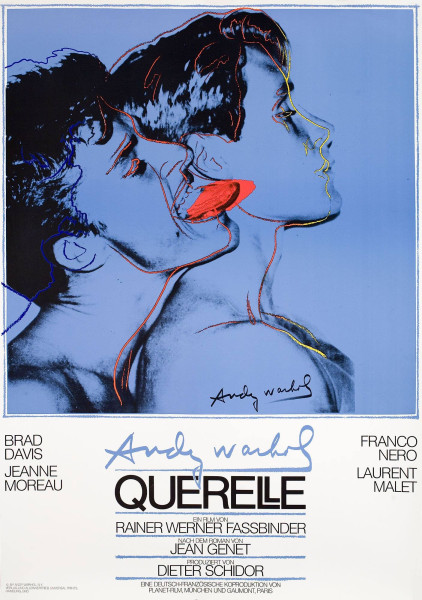Valentine with Monokino:
Outrageous, Controversial, Utterly Uncompromising!
QUERELLE
RAINER WERNER FASSBINDER — DE, 1982 – 108’

| 14/02 | 20:00 | O.666 | Ostend |
Monokino takes you on the stormy waves of desire with this Valentine’s screening of Querelle.
As an iconoclast and illegitimate son of the New Cinema movement, R.W. Fassbinder was never a director to shy away from scandal or be discouraged by difficult themes. On the contrary, a playful inclination toward controversy marked his relatively short yet immensely productive career. Querelle is regarded as the swan song of an impassioned political filmmaker and as the pinnacle of his provocations.
In the director’s final film, Jean Genet’s scandalous 1947 novel is brought to life with fervor. With the help of a hyper-expressionist color palette, plenty of explicit nudity, and some of the finest actors from European art cinema, Fassbinder subverts bourgeois standards of sexuality and ethics more stylishly than ever.
The result is a delirious fever dream that swells, simmers, and radiates fierce aggression. Sadly, Fassbinder did not live to witness the wave of criticism and outrage the film provoked—he succumbed to a barbiturate overdose before the premiere—but he would undoubtedly have reveled in it.
Querelle will be passionately introduced for us by Fassbinder fanboy Lennart Soberon.
~ ~ ~
With the support of Vlaams Audiovisueel Fonds and KAAP.
A program curated by Kinoautomat.
SUPPORT — Your support is more than welcome and literally brings light to the screen:
BE80 7340 4532 5277 BIC: KREDBEBB
Payment reference: ‘Gift’.
Gifts above the sum of € 40 are tax deductible.
A gift of € 100 will only cost you € 55.
Artistic coordination: Anouk De Clercq, Godart Bakkers
General coordination: Ditte Claus
Artistic team: Eric de Kuyper, Xavier Garcia Bardon
Production team: Bob Mees, Jef Declercq, Johan Opstaele, Noah Heylen
Communication: Cynthia Vandenbruaene
Graphic design: Michaël Bussaer. Webdesign: Dominique Callewaert.
With the support of Auguste Orts, CINEMATEK, KAAP, KASK School of Arts Gent, Onderzoeksfonds Universiteit Gent, Vlaams Audiovisueel Fonds, Vlaamse gemeenschap.

Whoever walks in Ostend today is confronted with a fantastic eclecticism: a brutal grey apartment block exists next to the glorious Thermae Palace. The mighty, almost Stalinist, building of De Grote Post dominates the Hendrik Serruyslaan. A former department store houses a museum for contemporary art. Belle-époque houses are hidden in the quiet but stately streets.
In 2017, one void struck artist Anouk De Clercq: that glorious film culture of Henri Storck, James Ensor or Raoul Servais had disappeared from the streets. With the closure of the Rialto cinema, the last independent cinema from the Ostend cinema circuit also disappeared. Against such an extraordinary backdrop, with the sea as a large projection surface for images, stories and histories, that is such a shame.
And so the idea of Monokino ripens: one room, marked by an equally fantastic eclecticism, where cinema can be itself again. One room where long and short films, film classics, auteur cinema, video art, experimental films, animation, or the work of young makers can find a place. Monokino shows, questions, responds, engages in conversation, invites, welcomes, puts in perspective. Monokino is a place of, by and for people from Ostend, for professionals and enthusiasts, for young and old, for those from here and those from there.
The films that Monokino wants to show don’t only live on the screen. They also spread between residents, spectators, and makers. In that sense, Monokino is also Kopfkino: a mental cinema, where images get the chance to live and multiply.
That’s how Monokino drifts nomadically through those eclectic streets of Ostend and settles in the heads and hearts of the people of Ostend. Soon it’ll moor for good.
Monokino wants to drive cinema into the 21st century and illuminate the adventurous side of film. While we strive for a permanent place as anchorage for cinefiles from Ostend and beyond, Monokino operates as a nomadic film platform.
The sea is Monokino’s favourite projection surface for images, stories and histories. In anticipation of our next screening, we’ve started to collect a list of films in which the sea plays a main or supporting role. Can you think of a film that’s not already on our list? We’d love to hear about it via info@monokino.org.
{{ film.title }}
{{ film.director }} — {{ film.year }}
